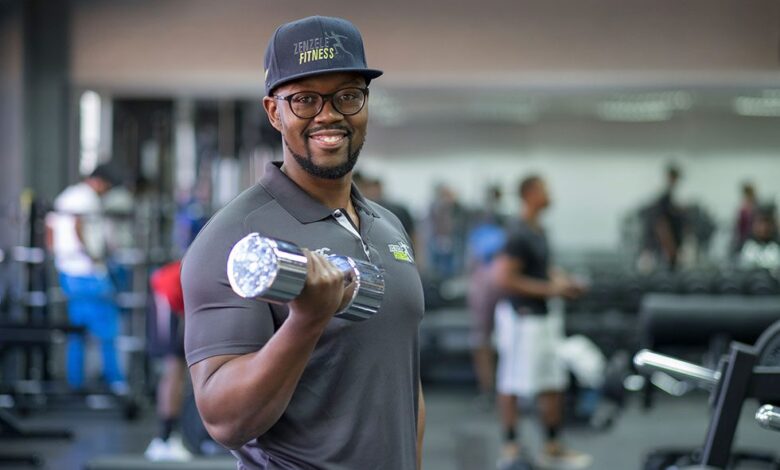From Banker to Fitness Pioneer: The Inspiring Journey of Tumi Phake and Zenzele Fitness

From Banker to Fitness Pioneer: The Inspiring Journey of Tumi Phake and Zenzele Fitness. After seven years in investment banking, Tumi Phake realised something powerful was missing. Working at a bank with an in‑house gym, he saw the value of corporate wellness. But he also saw a gap: most South Africans could not afford private gym memberships. Motivated by his love for health and a desire to create inclusive solutions, he left the security of finance in 2014 to launch Zenzele Fitness.
Tumi knew that fitness need not be a luxury only accessible to the elite. His goal was to bring affordable, high-quality wellness to workplaces, universities and communities, starting with gym and wellness centres integrated into everyday environments.
Merging Fitness Expertise with Technology
Tumi spent years studying the ins and outs of Virgin Active and Planet Fitness. He mapped gym floor layouts, equipment choices and operations models. When he launched Zenzele Fitness Group, he complemented physical fitness with tech: apps, trackers and data dashboards helped members and employers monitor progress and wellness outcomes.
This innovative integration of gym infrastructure and technology allowed Zenzele to promise not only exercise facilities but measurable health impact, making wellness a strategic part of organisational operations.

Funding Through Relationships, Not Just Banks
Early on, Tumi faced the challenge of raising capital. Banks were cautious, placing heavy emphasis on his lack of track record in fitness. He waited months for loan approvals just to outfit his first gym .
Rather than give up, he turned to trusted partners. Suppliers believed in his vision and delivered R2 million worth of equipment on trust alone, without any deposit. This level of trust reveals the importance of cultivating strong relationships, even more so when cash flow is tight.
Early Recognition That Built Momentum
In 2016, Tumi was selected for the Mandela Washington Fellowship, a flagship leadership programme under the Young African Leaders Initiative, where he met former US President Barack Obama. In 2017, he won Sanlam’s Entrepreneur of the Year award, a major nod that helped elevate Zenzele’s profile. He was also included in Mail & Guardian’s Top 200 Young South Africans.
These recognitions were more than trophies. They opened doors to partnerships, media exposure, and credibility among investors and clients.

Scaling with Intention and Social Impact
Zenzele took off in corporate South Africa. By 2020, the company operated 13 gyms serving over 10 000 members, with targets to reach 30 clubs and 40 000 members soon. These facilities were built inside or adjacent to workplaces, universities, and public institutions, making fitness as accessible as possible.
Zenzele’s unique value proposition lay in its inclusive pricing and business‑built infrastructure. With top‑tier equipment and tracked wellness programs, these gyms competed with commercial clubs but remained deeply embedded in daily life. The company also rolled out personalised wellness programs that tackled chronic diseases, reinforcing performance at work .
Key Lessons for Entrepreneurs
1. Follow your calling.
Tumi left a stable banking career because he saw a real need in society. Passion gives you resilience and purpose fuels success.
2. Leverage your existing strengths.
He used finance background to structure a scalable business model and the network he built in banking to raise funds and forge partnerships.
3. Build trust with people.
When mainstream financiers hesitated, suppliers stepped up. Trust so powerful it unlocks deals without contracts.
4. Embrace recognition-not vanity.
Awards and fellowships aren’t just accolades. They are social proof that builds credibility and accelerates opportunity.
5. Product‑market fit is critical.
Zenzele didn’t chase gyms downtown, they went where people already spent time: work, study, government. Convenience is a game changer.
6. Blend physical and digital.
Physical gyms were Zenzele’s core, but data and tracking tools added measurable value. This combination impressed clients and members alike.
7. Align profit with purpose.
Wellness services were not just business, they were social impact. Helping people stay healthy builds brand loyalty and competitive advantage.

Looking Ahead: A Pan‑African Vision
Tumi has big plans beyond South Africa. He wants Zenzele to be Africa’s largest fitness and wellness network. His focus is on expanding tech tools, launching fitness apps, and exploring wearable products. In the food and tech space, he’s already exploring opportunities, perhaps even wellness supplements or fitness platforms.
Every step of Zenzele’s growth is guided by ambition to improve lives, reduce chronic disease, and leave behind a legacy, just like his grandmother did when she built businesses on her own.
Final Thoughts
Tumi Phake’s story reminds us that success requires vision, courage and connection. He transformed from banker to fitness leader by noticing systemic gaps, using personal strengths, building trust-based relationships, earning recognition, and always putting purpose at the centre of profit. Zenzele Fitness is not just a company, it is a movement that empowers people and organisations to take ownership of their health. For any entrepreneur, his journey offers a road map: begin with empathy, build with intention, seek social validation, and grow with heart.



Your blog is a testament to your passion for your subject matter. Your enthusiasm is infectious, and it’s clear that you put your heart and soul into every post. Keep up the fantastic work!